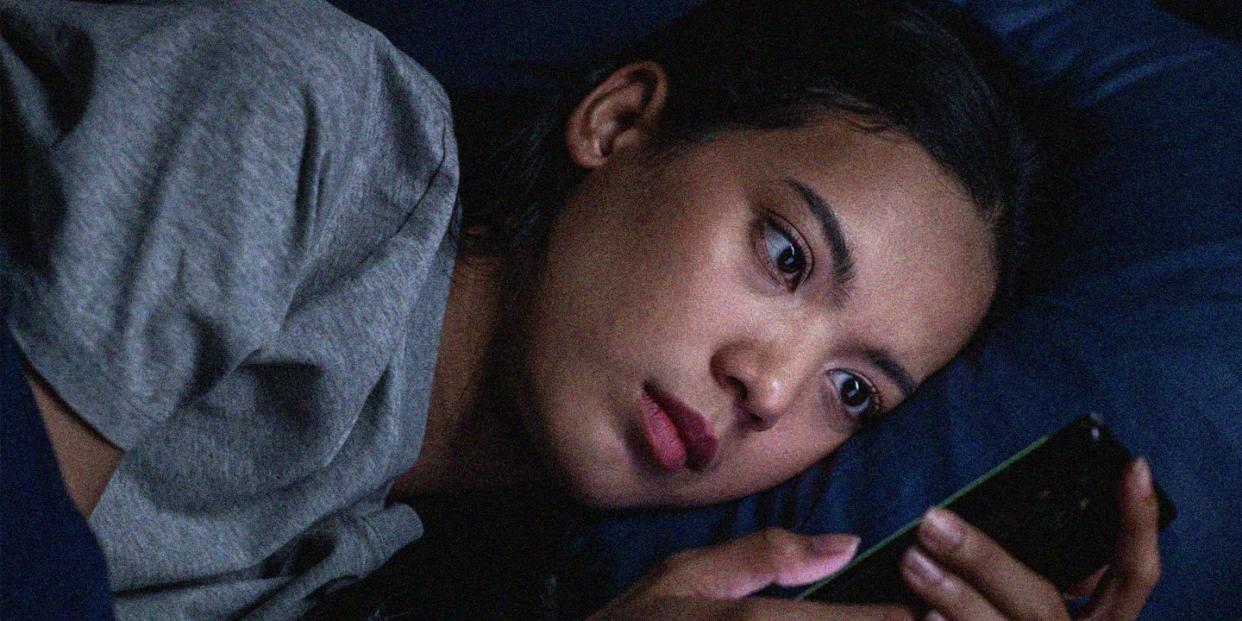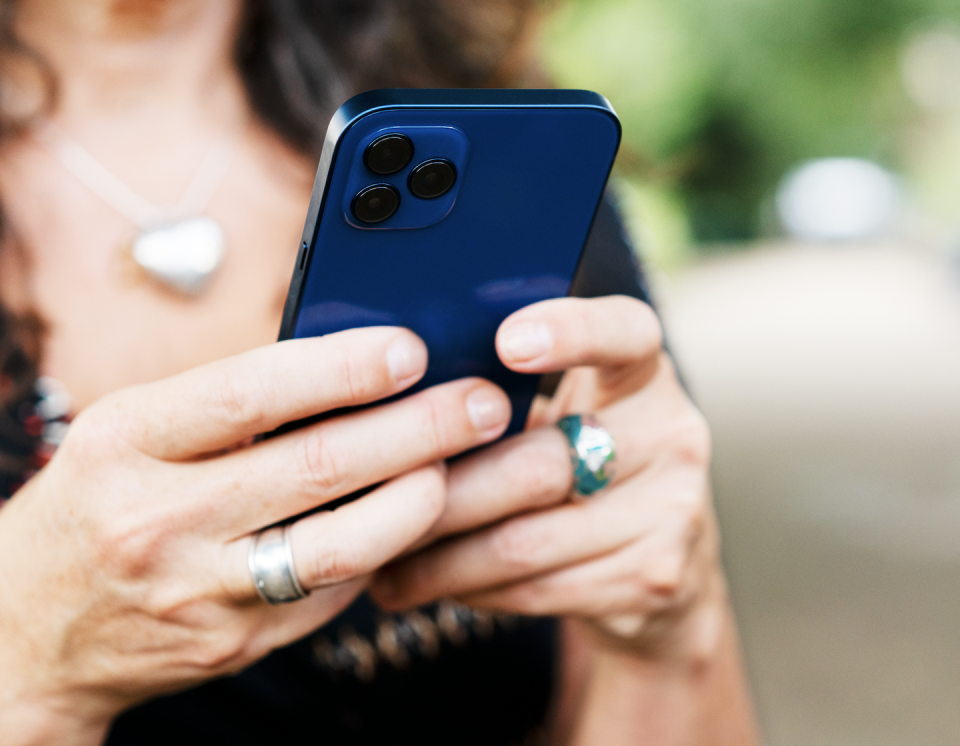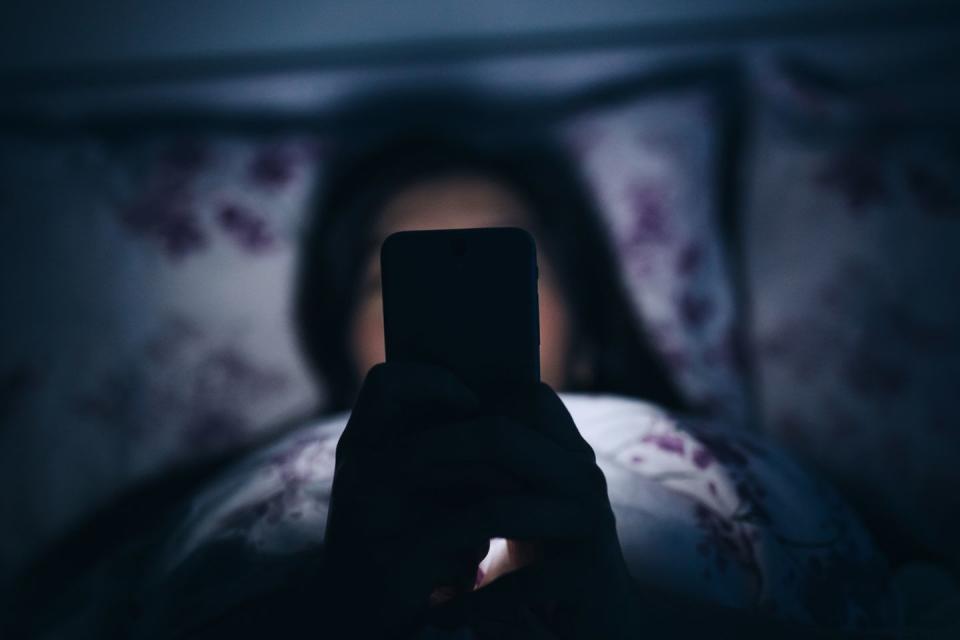Help for phone and internet addiction is more in-demand than support for drug dependency

Given that so much of our lives are now lived online, it's easier than ever to spend endless amounts of time on your phone - and slip into a cycle of doomscrolling, swiping and screen-staring. Morning, noon and night (same).
But if you're starting to feel like your phone habits are more in control of you than you are of them, it could be worth seeing if you're showing any of the signs of phone addiction. Yup, it's a thing - and it's on the rise.
There's been a 500% increase in searches for help and information related to phone addiction in the UK over the last few years, and it's not just our phones we're worrying about either – it's also what we're using them for. Rehabs UK report there are now more searches for information and support related to porn addiction each month than there are for cocaine, crack cocaine and meth addictions combined.

Can you really be addicted to your phone?
Firstly, let's look at what an addiction is – according to the NHS, addiction is "defined as not having control over doing, taking or using something to the point where it could be harmful to you". It adds that whilst addiction is "most commonly associated with gambling, drugs, alcohol and smoking, it's possible to be addicted to just about anything" including devices, working, and the internet.
"The study of behavioural addiction is still relatively new, and while there isn't a specific list of behavioural addictions that are determined as such, there are many kinds of activities that can result in addiction,” Rehabs UK founder, Lester Morse, told Cosmopolitan UK. "In theory, it is actually possible for a person to become addicted to any type of activity."
He adds, "Like any addiction, digital addictions are fuelled by stress, anxiety and a desire to escape from everyday reality in some way. It's is no huge surprise that in the midst of a cost of living crisis and wider mental health crisis, and with the legacy of lockdowns during the Covid-19 pandemic, we are seeing this big surge in the number of people living with behavioural addictions."
The expert continues on to explain that the difference between these types of addictions and the substances people typically think of when they think of an addict, is that the impact is often easier to hide. "You aren’t physically incapacitated in the same way as someone with a substance issue, and you may be more likely to spend increasing amounts of time alone, at home, out of sight."
Pamela Roberts, a Priory psychotherapist at the Priory’s Woking Hospital in Surrey, adds: "We are increasingly aware that behaviours, not just substances, can become addictive, and this raises the question of whether a phone is ‘addictive’ (and certainly smartphone apps are built to encourage more-ish behaviour), or whether the person has an addictive personality."
She continues, "If we are strongly attracted to something, or someone, our behaviour towards them is repeated many times and this can lead to a feeling we have lost our capacity to control behaviour." Addiction, Roberts also notes, can be a way of soothing or ‘uplifting’ our emotions. "This can create negative consequences which, in turn, cause shame, regret, and remorse, and the way to get away from those deep, negative emotions can be to ‘use’ again – in this case reach for the phone."

She points out that these behaviours can arise if a person is experiencing a difficult time, too. "If you are experiencing a tough time, for example in a relationship, are you constantly reaching for the phone? If you are experiencing any mild to serious issues or discomfort in your life, are you reaching for the phone? It is becoming a cultural norm to use a phone regularly; we see that in certain younger age groups. The pandemic has accelerated the use of online and smartphone time as a way of staying connected, but at what cost?"
What are the signs I'm addicted to my phone?
If you think you could fall into the category of smartphone addiction, Roberts says some helpful questions to ask yourself include:
Does your phone seriously interfere with sleep?
Are you constantly checking it?
Has certain behaviour become the norm (such as compulsively texting rather than talking to people around you, to the exclusion of other things in your life)?
Is your relationship or work or health suffering?
Are you constantly checking for messages or checking in on apps?
She also explains the criteria for addiction includes needing to "use" more to achieve the desired effect (e.g. are you scrolling for longer to get your social media fix?), wanting to cut down but failing, sacrificing most other activities as a result and feeling depressed and irritable when you can't use your phone. "You could also feel really angry when people don’t instantly return your texts," Roberts says.
Other questions to ask yourself are:
Have you put yourself or someone else at risk as a result of using it (walking into the road while checking it for example, or cycling and texting at the same time)?
Are you not attentive to friends or family because you are constantly checking and scrolling for the sake of scrolling?
Have you set timers for your use and failed, and do you get really irritated when people point out your behaviour?
Does your use seriously disrupt your life and relationships (do you get little else done?)
Do you read and re-read messages to the exclusion of other things?
Viewing your phone as an "emotional crutch" is also a possibility, says Roberts. "Sometimes that is ok, but for some people who have addictive tendencies, this reduces their resilience and eventually any twinge of emotion becomes the cue to reach for the phone."
If you're worried about a phone addiction, don't be afraid to speak to your GP about it or contact a mental health support service, such as Mind, to discuss support options.

How can I break my phone addiction?
If there's one woman who can answer that, it's Tanya Goodin, founder of digital wellbeing movement Time To Log Off. She advises the following:
Have 'no-go' zones
It's tricky trying implement a rule that says you put your phone down at 8pm every day, for instance. It's easier and more realistic to set boundaries around specific rooms in the house where screens don’t belong, then train yourself to leave them behind when you enter them, she says. "Everyone always thinks about bedrooms here, but actually bathrooms should be your priority." So stop scrolling aimlessly on the loo and make it a no-go zone for screens.
Swap video for audio
With the exponential rise of Zoom, it's more important than ever to get a handle on screen time time in 2021. Whenever you’re invited on a video call, ask if you can swap it for audio instead. "Unless it's a big group, there's no need to be staring at a screen while you talk – fix your eyes outside for a bit and stare at something green while you chat," says Goodin. Trying swapping TV in the evenings (yes, Netflix counts as screen time!), after a whole day spent on your laptop, for a new podcast series while you go for a walk too.
Keep your hands busy
You may be one of those people who think baking, crafting or puzzling all sounds a bit lame, but don’t knock it until you try it. "Finding something really absorbing to do with both your hands is a brilliant way of stopping you picking up your phone reflexively and scrolling with no purpose," explains Goodin. "Just an hour’s pause each day on a jigsaw kept me sane last year and really rested my eyes."
You Might Also Like


